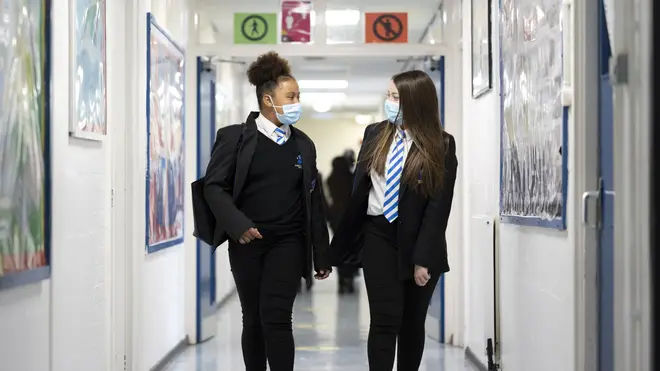
Clive Bull 1am - 4am
28 November 2021, 17:13 | Updated: 28 November 2021, 20:19

Pupils in year seven and above have been told to wear face masks in communal areas.
The Department for Education (DfE) has told England's schools that visitors should do the same.
International trips should also be reviewed. The guidance will be reviewed in three weeks.
It follows worries about the Omicron variant, which has been detected three times in the UK.
Boris Johnson has already announced a raft of restrictions to combat its spread, including by requiring arrivals to the UK to isolate until they get a negative Covid test, and ordering any contacts of a confirmed Omicron case to isolate regardless of their vaccination status.
An email update from the Department for Education to education and childcare providers said: "Face coverings should be worn in communal areas in all settings by staff, visitors and pupils or students in Year 7 and above, unless they are exempt.
Read more: Third UK Omicron case detected as compulsory face masks return
Read more: Schools bring back masks as Covid cases soar amongst pupils

Government plans to reintroduce face masks in shops and on transport
"Pupils or students (in Year 7 or above) should continue to wear face coverings on public and dedicated school transport, unless they are exempt."
Education Secretary Nadhim Zahawi said: "The news of a new variant - the so-called Omicron variant - will have understandably caused concern for people across our country, including our teachers, wider education and childcare staff, parents, pupils and students.
"We are already taking targeted and proportionate action as a precaution while we find out more information about the new variant.
"As we do so, we will continue to prioritise children's and young people's education and wellbeing, making sure education and childcare settings are as safe as possible and children continue to benefit from classroom teaching.
"We are working with education and childcare settings to enhance safety measures where needed, including introducing isolation for 10 days for close contacts of suspected Omicron cases.
"I'd like to thank everyone working to support our children and young people for their patience and hard work."

'Very difficult' for the government to enforce face masks in shops
A requirement for secondary school pupils to wear masks was dropped in May, as part of a tranche of restrictions that were eased in England's release from Covid lockdown.
The DfE's call will echo Mr Johnson's decision to implement the mandatory use of face masks in shops and on public transport.
He has introduced the measures to slow the spread of the Omicron variant, with experts racing to learn more about it. There is concern it could reduce the vaccines' protection but it is thought the jabs will still provide a defence against it.
"We will also go further in asking all of you to help contain the spread of this variant, by tightening up the rules on face coverings in shops and on public transport," Mr Johnson said.
LBC previously revealed how England's headteachers had asked for compulsory face masks to return, hoping it would curb rising Covid infections.
Schools had already been bringing back measures ahead of winter.
Kevin Courtney, joint general secretary of the National Education Union, said: "We welcome the DfE guidance that masks must be worn by adults and children in Year 7 and above in communal areas. We think the DfE should go further and encourage mask-wearing in secondary classrooms and also plan investment to improve ventilation and air filtration.
"These steps can all help reduce the spread of Covid and thereby reduce disruption to education. Omicron makes the threat of disruption of education all the clearer: any close contacts of an Omicron case, staff or pupils, will have to self-isolate for 10 days, whether vaccinated or not."